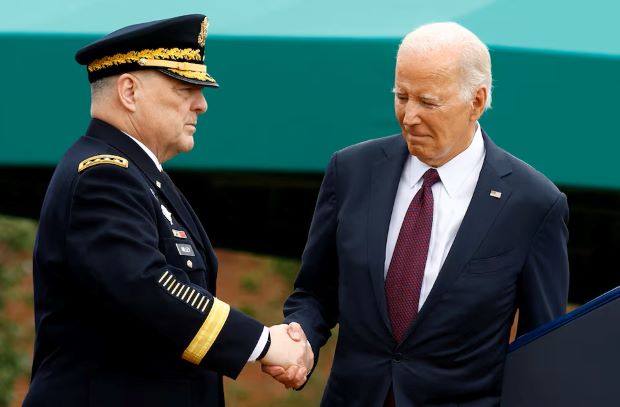Biden issues pre-emptive pardons to guard against Trump’s reprisals
By Peter Baker
WASHINGTON — President Joe Biden moved Monday (20) to guard some of President-elect Donald Trump’s most high-profile adversaries against a promised campaign of “retribution” by issuing pre-emptive pardons that would make it harder if not impossible for the next administration to prosecute them.
Among those receiving pre-emptive pardons were Gen. Mark Milley, former chair of the Joint Chiefs of Staff; Dr Anthony Fauci, long-time government scientist who advised Trump during the coronavirus pandemic; and all the members of the bipartisan House committee that investigated the Jan. 6, 2021, attack on the Capitol, including former Rep. Liz Cheney, R-Wyo.
“These are exceptional circumstances, and I cannot in good conscience do nothing,” Biden said in a statement. “Baseless and politically motivated investigations wreak havoc on the lives, safety and financial security of targeted individuals and their families.
“Even when individuals have done nothing wrong — and in fact have done the right thing — and will ultimately be exonerated, the mere fact of being investigated or prosecuted can irreparably damage reputations and finances,” he said.
Acting just hours before leaving office, Biden effectively turned the president’s constitutional power of forgiveness into a protective shield against what he maintains would be politically driven vengeance. No other president has employed executive clemency in such a broad and overt way to thwart a successor he believes would abuse his power.
As Biden has considered such a move in recent days, his aides have stressed that he does not believe the people who would receive pardons have actually committed any crimes. But he and his aides have cited Trump’s repeated vows to go after them upon taking office Monday.
Throughout his campaign last year, Trump threatened to prosecute Democrats, election workers, law enforcement officials, intelligence officials, reporters, former members of his own staff and Republicans who do not support him, often without identifying any specific criminal activity.
Cheney and Fauci are among those he and his allies have singled out by name, along with others, including Biden himself. Trump has said he would “appoint a real special prosecutor to go after” Biden and his family.
Biden previously issued a pardon to his son Hunter that covered any possible crimes over an 11-year period, but the president did not include himself or any other members of his family in the pre-emptive pardons announced Monday.
Not everyone targeted by Trump has welcomed pardons, arguing that accepting them would give the impression that they had done something wrong.
“As soon as you take a pardon, it looks like you are guilty of something,” former Rep. Adam Kinzinger, R-Ill., who served on the Jan. 6 committee along with Cheney, said on CNN this month.
“I am guilty of nothing besides bringing the truth to the American people and, in the process, embarrassing Donald Trump. Because for 187 minutes, he sat there and did absolutely nothing and showed how weak and scared he truly was,” he added, referring to the former president’s inaction during the attack on Jan. 6.
“So no, I don’t want it,” he said of the pardon.
Others said it would be an inappropriate use of the pardon power. “It would be the wrong precedent to set,” Sen. Adam Schiff, D-Calif., who led the prosecution during Trump’s first impeachment trial, said on CNN this month. “I don’t want to see each president hereafter on their way out the door giving a broad category of pardons to members of their administration.”
Biden’s use of the pardon power to immunize people who have not even come under investigation, much less been charged or convicted of a crime, has no clear precedent. But some legal scholars have said that he is within the boundaries of his authority. The closest precedent might be President Gerald Ford’s pardon of his disgraced predecessor, Richard Nixon, in 1974 even though he had not been charged with any crimes.
But Nixon faced a real threat of prosecution from a special counsel investigating the Watergate scandal that forced his resignation, and Ford was not acting to thwart a future president the way Biden is.
Trump at times has suggested that he might not follow through on his threats, saying that success as president would be the true “retribution”. But the allies he has tapped to run the Justice Department and FBI are considered partisan warriors for him, and their selections, which still need to be confirmed by the Senate, have alarmed many of Trump’s critics and indicated that he is serious about reprisals.
For attorney general, Trump chose Pam Bondi, a former Florida attorney general who echoed his false claims about the 2020 election. For FBI director, he has named Kash Patel, a firebrand operative who has vowed to “come after” Trump’s critics in the media and identified his own list of 60 people he considers “deep state” obstacles to the incoming president.
Trump has said on social media that Cheney “should be prosecuted for what she has done to our country” and that the whole Jan. 6 committee “should be prosecuted for their lies and, quite frankly, TREASON!” He said that Vice President Kamala Harris “should be impeached and prosecuted”. He has suggested that Milley deserved execution.
-New York Times



Comments are closed, but trackbacks and pingbacks are open.